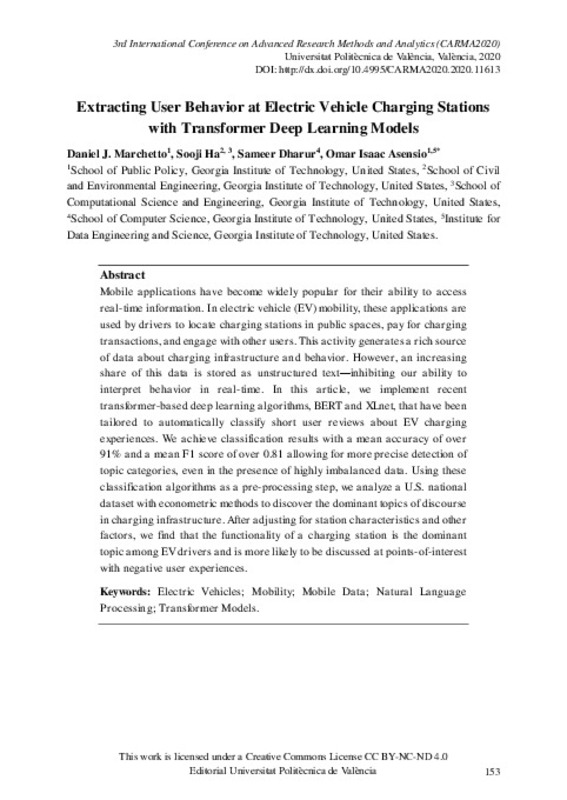JavaScript is disabled for your browser. Some features of this site may not work without it.
Buscar en RiuNet
Listar
Mi cuenta
Estadísticas
Ayuda RiuNet
Admin. UPV
Extracting User Behavior at Electric Vehicle Charging Stations with Transformer Deep Learning Models
Mostrar el registro sencillo del ítem
Ficheros en el ítem
| dc.contributor.author | Marchetto, Daniel
|
es_ES |
| dc.contributor.author | Ha, Sooji
|
es_ES |
| dc.contributor.author | Dharur, Sameer
|
es_ES |
| dc.contributor.author | Asensio, Omar
|
es_ES |
| dc.date.accessioned | 2020-07-30T10:56:11Z | |
| dc.date.available | 2020-07-30T10:56:11Z | |
| dc.date.issued | 2020-05-11 | |
| dc.identifier.isbn | 9788490488324 | |
| dc.identifier.uri | http://hdl.handle.net/10251/148979 | |
| dc.description.abstract | [EN] Mobile applications have become widely popular for their ability to access real-time information. In electric vehicle (EV) mobility, these applications are used by drivers to locate charging stations in public spaces, pay for charging transactions, and engage with other users. This activity generates a rich source of data about charging infrastructure and behavior. However, an increasing share of this data is stored as unstructured text—inhibiting our ability to interpret behavior in real-time. In this article, we implement recent transformer-based deep learning algorithms, BERT and XLnet, that have been tailored to automatically classify short user reviews about EV charging experiences. We achieve classification results with a mean accuracy of over 91% and a mean F1 score of over 0.81 allowing for more precise detection of topic categories, even in the presence of highly imbalanced data. Using these classification algorithms as a pre-processing step, we analyze a U.S. national dataset with econometric methods to discover the dominant topics of discourse in charging infrastructure. After adjusting for station characteristics and other factors, we find that the functionality of a charging station is the dominant topic among EV drivers and is more likely to be discussed at points-of-interest with negative user experiences. | es_ES |
| dc.language | Inglés | es_ES |
| dc.publisher | Editorial Universitat Politècnica de València | es_ES |
| dc.rights | Reconocimiento - No comercial - Sin obra derivada (by-nc-nd) | es_ES |
| dc.subject | Web data | es_ES |
| dc.subject | Internet data | es_ES |
| dc.subject | Big data | es_ES |
| dc.subject | Qca | es_ES |
| dc.subject | Pls | es_ES |
| dc.subject | Sem | es_ES |
| dc.subject | Conference | es_ES |
| dc.subject | Electric Vehicles | es_ES |
| dc.subject | Mobility | es_ES |
| dc.subject | Mobile Data | es_ES |
| dc.subject | Natural Language Processing | es_ES |
| dc.subject | Transformer Models | es_ES |
| dc.title | Extracting User Behavior at Electric Vehicle Charging Stations with Transformer Deep Learning Models | es_ES |
| dc.type | Capítulo de libro | es_ES |
| dc.type | Comunicación en congreso | es_ES |
| dc.identifier.doi | 10.4995/CARMA2020.2020.11613 | |
| dc.rights.accessRights | Abierto | es_ES |
| dc.description.bibliographicCitation | Marchetto, D.; Ha, S.; Dharur, S.; Asensio, O. (2020). Extracting User Behavior at Electric Vehicle Charging Stations with Transformer Deep Learning Models. Editorial Universitat Politècnica de València. 153-162. https://doi.org/10.4995/CARMA2020.2020.11613 | es_ES |
| dc.description.accrualMethod | OCS | es_ES |
| dc.relation.conferencename | CARMA 2020 - 3rd International Conference on Advanced Research Methods and Analytics | es_ES |
| dc.relation.conferencedate | Julio 08-09,2020 | es_ES |
| dc.relation.conferenceplace | Valencia, Spain | es_ES |
| dc.relation.publisherversion | http://ocs.editorial.upv.es/index.php/CARMA/CARMA2020/paper/view/11613 | es_ES |
| dc.description.upvformatpinicio | 153 | es_ES |
| dc.description.upvformatpfin | 162 | es_ES |
| dc.type.version | info:eu-repo/semantics/publishedVersion | es_ES |
| dc.relation.pasarela | OCS\11613 | es_ES |








